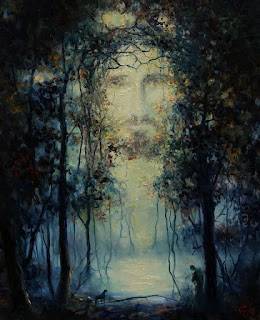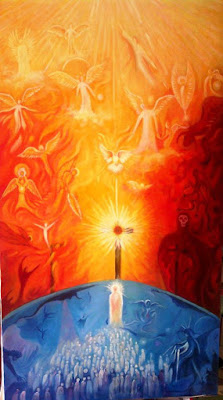John 8:1-12
Jesus returned to the Mount of Olives, but as soon as day dawned, he was already in the Temple court, where the people flocked to him, and he sat down and began to teach them. The teachers of the law and the Pharisees led in a woman caught in adultery. They made her stand in the middle and said to Jesus, "Teacher, this woman was caught in the act of adultery. In the law, Moses commanded us to stone such women. Now, what do you say?" They said this only as a trap, in order finally to have a reason for accusing him.
But
Jesus bent down and started to writeNinetta Sombart
something into the earth with his finger. When they kept on pressing him with
questions, he stood up and said to them, "Whoever among you is without
sin, let him cast the first stone at her." And again, he bent down and
wrote into the earth.
When they heard this, their conscience began to stir within them, and they went out, one after the other, starting with the eldest. And only Jesus was left and the woman who stood in the middle. Jesus stood up and said to her, "Woman, where are they? Has no one passed judgment on you?"
"No one, sir," she said.
Then Jesus declared, "Neither do I condemn you. Go now and leave your life of sin."
And
Jesus began to speak to them again: "I am the light of the world; whoever
follows me will not walk in darkness but
have the light in which there is life."
3rd Passiontide Sunday
April
3, 2022
John 8:1-12
The light and warmth of the sun can be absorbed or reflected. A dark object absorbs the warmth. A light, polished surface stays cooler because it mirrors light back.
Our minds and hearts can also absorb or reflect. We can listen, absorb, take in. When what we take in enters not just our minds but our hearts, they can become warm. In so doing, we ourselves are likely to be transformed. The genius of the language says that our hearts melt.
And
we can also listen and reflect back. Usually, we reflect back our own soul's
reaction. We reflect our ego's rush to judgment. An immediate judgment may be a
kind of self-protection coming from the soul's defensive armoring. Being too quick
to deflect with our thinking, we bypass absorbing into our heart what is said and
possibly being transformed. Deborah Harris
In this gospel reading, Christ shows Himself to be someone whose heart and mind work together in a healing way. He does not reflexively reject the woman because she broke the law. He takes her into His great heart, the warmth of His broad understanding of the ways of human behavior, of social interaction, of karma. He then reflects back to her not judgment but rather gives her the strength of His warm understanding and His encouragement to do better. He absorbs her life into His. He carries her in the light of His life.
The poet Nelly Sachs wrote,
How long have we forgotten to listen!
He planted us once to listen
Like lyme grass by the eternal sea ....
Although we have business
that leads us far
From his light….
We must not sell our ears….
Press, oh press in the day of destruction
The listening ear to the earth,
And you will hear, through your sleep,
You will hear,
How in death
Life begins.*
The deeds of each one of us are written into the earth. But the earth has become Christ's body. He absorbs all of our deeds. He carries us in His great heart. He gives us the encouragement and the strength to do better so that we can walk in the light of His life.
*Nelly Sachs (1891-1970), “How Long Have We Forgotten to Listen!” in Women in Praise of the Sacred, Jane
Hirschfield.

































